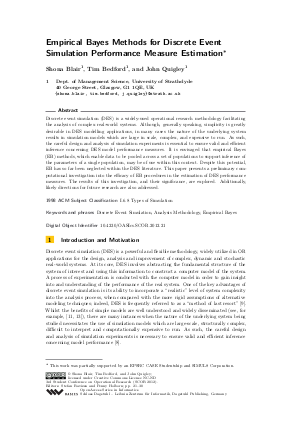Empirical Bayes Methods for Discrete Event Simulation Performance Measure Estimation
Authors Shona Blair, Tim Bedford, John Quigley
-
Part of:
Volume:
3rd Student Conference on Operational Research (SCOR 2012)
Part of: Series: Open Access Series in Informatics (OASIcs) - License:
 Creative Commons Attribution-NonCommercial-NoDerivs 3.0 Unported license
Creative Commons Attribution-NonCommercial-NoDerivs 3.0 Unported license
- Publication Date: 2012-06-26
File

PDF
OASIcs.SCOR.2012.21.pdf
- Filesize: 401 kB
- 10 pages
Document Identifiers
Subject Classification
Keywords
- Discrete Event Simulation
- Analysis Methodology
- Empirical Bayes
Metrics
- Access Statistics
-
Total Accesses (updated on a weekly basis)
0Document
0Metadata
Abstract
Discrete event simulation (DES) is a widely-used operational research methodology facilitating the analysis of complex real-world systems. Although, generally speaking, simplicity is greatly desirable in DES modelling applications, in many cases the nature of the underlying system results in simulation models which are large in scale, complex, and expensive to run. As such, the careful design and analysis of simulation experiments is essential to ensure valid and efficient inference concerning DES model performance measures. It is envisaged that empirical Bayes (EB) methods, which enable data to be pooled across a set of populations to support inference of the parameters of a single population, may be of use within this context. Despite this potential, EB has so far been neglected within the DES literature. This paper presents a preliminary computational investigation into the efficacy of EB procedures in the estimation of DES performance measures. The results of this investigation, and their significance, are explored. Additionally, likely directions for future research are also addressed.
Cite As Get BibTex
Shona Blair, Tim Bedford, and John Quigley. Empirical Bayes Methods for Discrete Event Simulation Performance Measure Estimation. In 3rd Student Conference on Operational Research. Open Access Series in Informatics (OASIcs), Volume 22, pp. 21-30, Schloss Dagstuhl – Leibniz-Zentrum für Informatik (2012)
https://doi.org/10.4230/OASIcs.SCOR.2012.21
BibTex
@InProceedings{blair_et_al:OASIcs.SCOR.2012.21,
author = {Blair, Shona and Bedford, Tim and Quigley, John},
title = {{Empirical Bayes Methods for Discrete Event Simulation Performance Measure Estimation}},
booktitle = {3rd Student Conference on Operational Research},
pages = {21--30},
series = {Open Access Series in Informatics (OASIcs)},
ISBN = {978-3-939897-39-2},
ISSN = {2190-6807},
year = {2012},
volume = {22},
editor = {Ravizza, Stefan and Holborn, Penny},
publisher = {Schloss Dagstuhl -- Leibniz-Zentrum f{\"u}r Informatik},
address = {Dagstuhl, Germany},
URL = {https://drops.dagstuhl.de/entities/document/10.4230/OASIcs.SCOR.2012.21},
URN = {urn:nbn:de:0030-drops-35436},
doi = {10.4230/OASIcs.SCOR.2012.21},
annote = {Keywords: Discrete Event Simulation, Analysis Methodology, Empirical Bayes}
}
